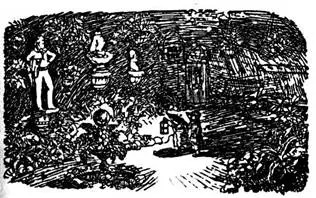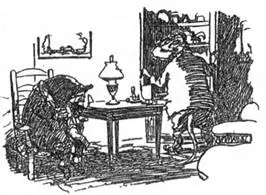At last he said, very quietly and sympathetically,
‘What is it, old fellow? Whatever can be the matter? Tell us your trouble, and
let me see what I can do.’
Poor Mole
found it difficult to get any words out between the upheavals of his chest that
followed one upon another so quickly and held back speech and choked it as it
came. ‘I know it’s a — shabby, dingy little place,’ he sobbed forth at last,
brokenly: ‘not like — your cosy quarters — or Toad’s beautiful hall — or
Badger’s great house — but it was my own little home — and I was fond of it —
and I went away and forgot all about it — and then I smelt it suddenly — on the
road, when I called and you wouldn’t listen, Rat — and everything came back to
me with a rush — and I wanted it! — O dear, O dear! — and when you wouldn’t
turn back, Ratty — and I had to leave it, though I was smelling it all the time
— I thought my heart would break. — We might have just gone and had one look at
it, Ratty — only one look — it was close by — but you wouldn’t turn back,
Ratty, you wouldn’t turn back! O dear, O dear!’
Recollection
brought fresh waves of sorrow, and sobs again took full charge of him,
preventing further speech.
The Rat stared
straight in front of him, saying nothing, only patting Mole gently on the
shoulder. After a time he muttered gloomily, ‘I see it all now! What a pig
I have been! A pig — that’s me! Just a pig — a plain pig!’
He waited till
Mole’s sobs became gradually less stormy and more rhythmical; he waited till at
last sniffs were frequent and sobs only intermittent. Then he rose from his
seat, and, remarking carelessly, ‘Well, now we’d really better be getting on,
old chap!’ set off up the road again, over the toilsome way they had come.
‘Wherever are
you (hic) going to (hic), Ratty?’ cried the tearful Mole, looking up in alarm.
‘We’re going
to find that home of yours, old fellow,’ replied the Rat pleasantly; ‘so you
had better come along, for it will take some finding, and we shall want your
nose.’
‘Oh, come
back, Ratty, do!’ cried the Mole, getting up and hurrying after him. ‘It’s no
good, I tell you! It’s too late, and too dark, and the place is too far off,
and the snow’s coming! And — and I never meant to let you know I was feeling
that way about it — it was all an accident and a mistake! And think of River
Bank, and your supper!’
‘Hang River
Bank, and supper too!’ said the Rat heartily. ‘I tell you, I’m going to find
this place now, if I stay out all night. So cheer up, old chap, and take my
arm, and we’ll very soon be back there again.’
Still snuffling,
pleading, and reluctant, Mole suffered himself to be dragged back along the
road by his imperious companion, who by a flow of cheerful talk and anecdote
endeavoured to beguile his spirits back and make the weary way seem shorter.
When at last it seemed to the Rat that they must be nearing that part of the
road where the Mole had been ‘held up,’ he said, ‘Now, no more talking.
Business! Use your nose, and give your mind to it.’
They moved on
in silence for some little way, when suddenly the Rat was conscious, through
his arm that was linked in Mole’s, of a faint sort of electric thrill that was
passing down that animal’s body. Instantly he disengaged himself, fell back a
pace, and waited, all attention.
The signals
were coming through!
Mole stood a
moment rigid, while his uplifted nose, quivering slightly, felt the air.
Then a short,
quick run forward — a fault — a check — a try back; and then a slow, steady,
confident advance.
The Rat, much
excited, kept close to his heels as the Mole, with something of the air of a
sleep-walker, crossed a dry ditch, scrambled through a hedge, and nosed his way
over a field open and trackless and bare in the faint starlight.
Suddenly,
without giving warning, he dived; but the Rat was on the alert, and promptly followed
him down the tunnel to which his unerring nose had faithfully led him.
It was close
and airless, and the earthy smell was strong, and it seemed a long time to Rat
ere the passage ended and he could stand erect and stretch and shake himself.
The Mole struck a match, and by its light the Rat saw that they were standing
in an open space, neatly swept and sanded underfoot, and directly facing them
was Mole’s little front door, with ‘Mole End’ painted, in Gothic lettering,
over the bell-pull at the side.
Mole reached
down a lantern from a nail on the wail and lit it, and the Rat, looking round
him, saw that they were in a sort of fore-court. A garden-seat stood on one
side of the door, and on the other a roller; for the Mole, who was a tidy
animal when at home, could not stand having his ground kicked up by other
animals into little runs that ended in earth-heaps. On the walls hung wire
baskets with ferns in them, alternating with brackets carrying plaster statuary
— Garibaldi, and the infant Samuel, and Queen Victoria, and other heroes of
modern Italy. Down on one side of the forecourt ran a skittle-alley, with
benches along it and little wooden tables marked with rings that hinted at
beer-mugs. In the middle was a small round pond containing gold-fish and
surrounded by a cockle-shell border. Out of the centre of the pond rose a
fanciful erection clothed in more cockle-shells and topped by a large silvered
glass ball that reflected everything all wrong and had a very pleasing effect.

Mole’s
face-beamed at the sight of all these objects so dear to him, and he hurried
Rat through the door, lit a lamp in the hall, and took one glance round his old
home. He saw the dust lying thick on everything, saw the cheerless, deserted
look of the long-neglected house, and its narrow, meagre dimensions, its worn
and shabby contents — and collapsed again on a hall-chair, his nose to his
paws. ‘O Ratty!’ he cried dismally, ‘why ever did I do it? Why did I bring you
to this poor, cold little place, on a night like this, when you might have been
at River Bank by this time, toasting your toes before a blazing fire, with all
your own nice things about you!’

The Rat paid
no heed to his doleful self-reproaches. He was running here and there, opening
doors, inspecting rooms and cupboards, and lighting lamps and candles and
sticking them, up everywhere. ‘What a capital little house this is!’ he called
out cheerily. ‘So compact! So well planned! Everything here and everything in
its place! We’ll make a jolly night of it. The first thing we want is a good
fire; I’ll see to that — I always know where to find things. So this is the
parlour? Splendid! Your own idea, those little sleeping-bunks in the wall?
Capital! Now, I’ll fetch the wood and the coals, and you get a duster, Mole —
you’ll find one in the drawer of the kitchen table — and try and smarten things
up a bit. Bustle about, old chap!’
Encouraged by
his inspiriting companion, the Mole roused himself and dusted and polished with
energy and heartiness, while the Rat, running to and fro with armfuls of fuel,
soon had a cheerful blaze roaring up the chimney. He hailed the Mole to come
and warm himself; but Mole promptly had another fit of the blues, dropping down
on a couch in dark despair and burying his face in his duster. ‘Rat,’ he
moaned, ‘how about your supper, you poor, cold, hungry, weary animal? I’ve
nothing to give you — nothing — not a crumb!’
‘What a fellow
you are for giving in!’ said the Rat reproachfully. ‘Why, only just now I saw a
sardine-opener on the kitchen dresser, quite distinctly; and everybody knows
that means there are sardines about somewhere in the neighbourhood. Rouse
yourself! pull yourself together, and come with me and forage.’
They went and
foraged accordingly, hunting through every cupboard and turning out every
drawer. The result was not so very depressing after all, though of course it
might have been better; a tin of sardines — a box of captain’s biscuits, nearly
full — and a German sausage encased in silver paper.
‘There’s a
banquet for you!’ observed the Rat, as he arranged the table. ‘I know some
animals who would give their ears to be sitting down to supper with us
to-night!’
‘No bread!’
groaned the Mole dolorously; ‘no butter, no —’
‘No pâté de
foie gras, no champagne!’ continued the Rat, grinning. ‘And that reminds me
— what’s that little door at the end of the passage? Your cellar, of course!
Every luxury in this house! Just you wait a minute.’
He made for
the cellar-door, and presently reappeared, somewhat dusty, with a bottle of
beer in each paw and another under each arm, ‘Self-indulgent beggar you seem to
be, Mole,’ he observed. ‘Deny yourself nothing.
1 comment